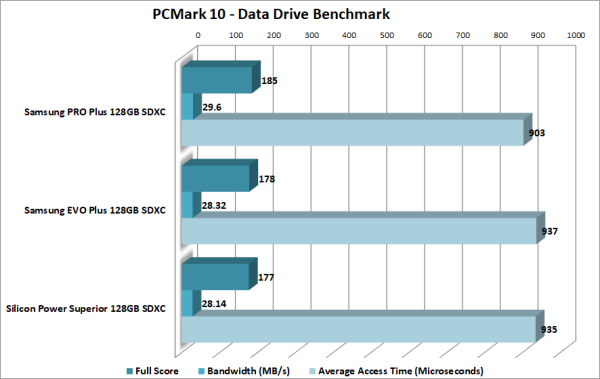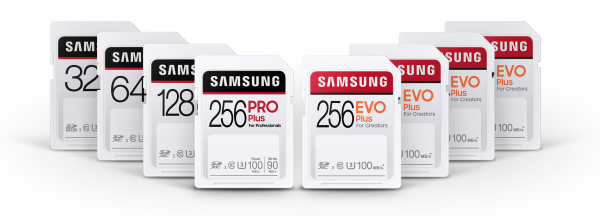The test system used in this review is equipped with an AMD Ryzen 3 3100 CPU, MSI B550 GAMING PLUS motherboard, 16GB (8GB x 2) of Crucial Ballistix 3200 MHz DDR4 memory, Crucial P5 1TB SSD, GIGABYTE GeForce GTX 1060 WINDFORCE OC 6G graphics card and a Transcend TS-RDF5K USB 3.0 card reader. For the operating system, I used the latest version of Windows 10 Pro.
To test the performance of Samsung's PRO Plus and EVO Plus SD cards, I ran a series of benchmarks using CrystalDiskMark, ATTO Disk Benchmark and PCMark 10. To get a feel for the "real world" performance, I also copied and pasted 1GB of random files and directories as well as a single 4GB ISO file in Windows Explorer.
CrystalDiskMark 5.1.2:
First, I ran a few quick tests using CrystalDiskMark. This benchmark tool measures the performance of a storage device by testing its sequential read and write speeds as well as its random read and write speeds using blocks 512K and 4K in size.
According to Samsung, the 128GB version of their PRO Plus SD card is capable of reading at 100 MB/s and writing at 90 MB/s. While the card performed relatively well, it came up a bit short of these numbers in CrystalDiskMark's sequential read and write speed tests. The EVO Plus performed equally well when reading but, with a rated speed of 60 MB/s, it wasn't as fast as the PRO Plus when writing.
ATTO Disk Benchmark 2.46:
I also used ATTO Disk Benchmark to test the PRO Plus and EVO Plus SD cards' sequential read and write speeds. The test was run using blocks ranging in size from 0.5KB to 8192KB and the total length set to 256MB.
When tested with ATTO, the PRO Plus SD card's read speeds topped out at about 97 MB/s and its write speeds at 88 MB/s. The EVO Plus was also able to read at 97 MB/s. However, it reached a maximum write speed of only 68 MB/s.
PCMark 10 - Data Drive Benchmark:
PCMark 10's Data Drive Benchmark is designed to test drives that are used for storing files rather than applications. You can also use this test with NAS drives, USB sticks, memory cards, and other external storage devices. This benchmark produces an overall score as a measure of drive performance. Comparing devices is as simple as comparing scores. The tests also measure and report the bandwidth and average access time for the drive.
Both cards performed well in PCMark 10's Data Drive Benchmark. The PRO Plus was able to take the top spot though, thanks to its faster write speed and lower average access time.
"Real World" Benchmark:
To test the "real world" performance of Samsung's PRO Plus and EVO Plus SD memory cards, I copied and pasted 1GB worth of randomly generated files and directories. All of the files are between 1KB and 95MB in size and no more than five directories deep. To see how well the cards handled large files, I also copied and pasted a 4GB ISO file.
| Samsung PRO Plus 128GB SDXC | Samsung EVO Plus 128GB SDXC | |
| 1GB Files - Write: | 22 seconds | 24 seconds |
| 1GB Files - Read: | 14 seconds | 14 seconds |
| 4GB ISO File - Write: | 52 seconds | 1:05 |
| 4GB ISO File - Read: | 45 seconds | 45 seconds |
The PRO Plus and EVO Plus performed pretty well here. The two cards were equally fast when reading. However, the PRO Plus was, once again, slightly faster when writing.
Final Thoughts:
Samsung's new PRO Plus and EVO Plus SD cards are a great addition to the company's already impressive line of flash memory cards. Designed and produced in-house, these new standard-size SD cards feature exceptional speeds and, with capacity options ranging from 32GB to 256GB, the ability to store thousands of high-resolution photos or hours worth of 4K Ultra HD video. The PRO Plus and EVO Plus are also built to withstand intensive usage and the most rugged conditions. In addition to being water, temperature, x-ray, magnet and shock proof, the cards are drop and wear proof, allowing them to withstand five-meter drops and up to 10,000 swipes.
Aside from price, the biggest difference between Samsung's PRO Plus and EVO Plus cards is the performance. The PRO Plus is aimed at professionals and, with its ability to read at 100 MB/s and write at speeds up to 90 MB/s, it's perfect for DSLR cameras and 4K camcorders. The EVO Plus isn't as fast when writing, but, with a sequential write speed of 60 MB/s, the higher capacity cards do support 4K Ultra HD recording. The lower capacity cards top out at only 20 MB/s though, making them better suited for HD camcorders, compact cameras and video editing.
Preorders for the PRO Plus and EVO Plus cards begin today (October 13th, 2020) and, in most cases, will be available on October 19th. Suggested retail prices for the PRO Plus range from $10 up to $50 with the EVO Plus running from $7 up to $40.







